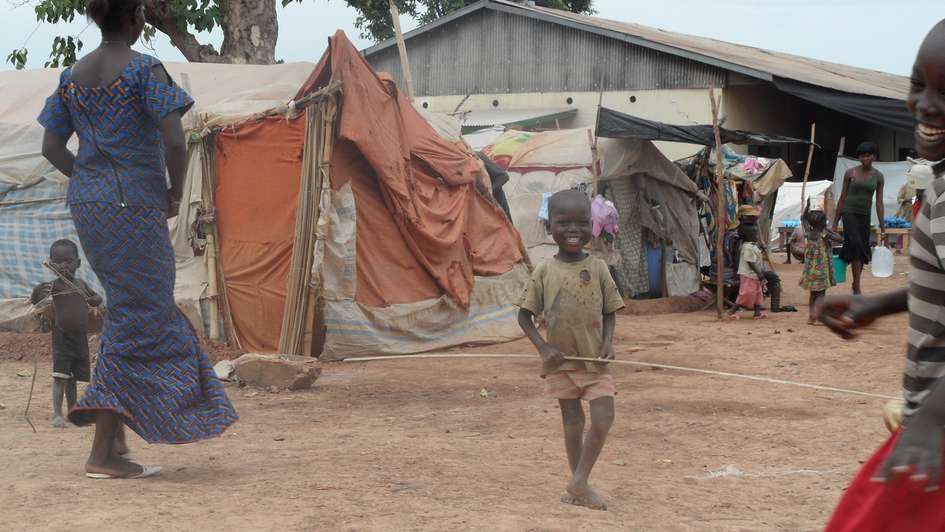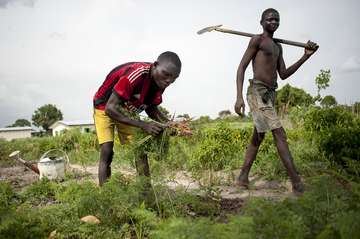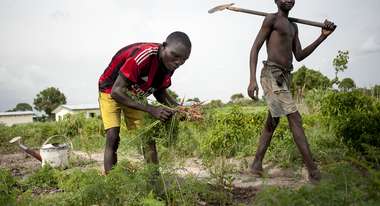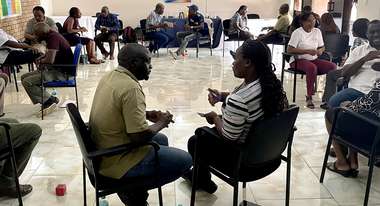Our Assistance in the Central African Republic
Unrest, violence and flight: We are supporting people to cope with life during the crisis.

It's good if you have a vegetable field. It's good if it even produces enough crops for you to sell some of them at the local markets. It's good if you can work this field in safety. The Central African Republic could actually provide its inhabitants with all the necessary conditions: The soils are fertile, there is sufficient rain. Three-quarters of all people live from agriculture - actually… But constant violence and unrest have plunged the country into chaos since 2013.
For more than two and a half years, political crises and violent conflicts have rocked the Central African Republic and forced many people - in particular the rural population - to flee. One in two of the 4.6 million inhabitants is dependent on humanitarian assistance (UNOCHA 09/2015). Agricultural production has also drastically declined and the prices for food have exploded. Agriculture - once the backbone of economic life - lies fallow. More than 30% of the population suffers from hunger and has no access to clean drinking water or sanitation facilities.
Project Info
Strengthening & transitional aid for people in Bangui
Aims:
- Securing nutrition
- Securing agricultural production
- Create stable income
- Building infrastructure (roads, school, health centre, wells etc.)
- Increasing spending power through 'Cash for Work'
- Strengthening civil society engagement
Supported people: 125,000
Project duration: 2014-2016 - supported by GIZ
Last refuge: Airport
Hundreds of thousands of people fled from the violence into the capital Bangui. For a long time, the international airport was one of the safest places, where refugees crowded into its grounds. In recent months, many of them have been able to return to their villages again. However, 10,000 people still live in temporary huts and shelters between old hangars and aeroplane wrecks, extremely close to the runway, and are dependent on food parcels from relief organisations.
The vegetable farmers of Bangui - fields beside the runway
Many of the displaced persons have meanwhile begun to grow vegetables. Cabbage, watermelons, cucumbers, tomatoes and many more grow in the middle of the airport. And on the opposite side of the runway, the population living there has been cultivating vegetables for a while now and to an increasing extent. A resettlement is needed urgently - not least for safety reasons.
There is already the land for it: 100 hectares of free land for settling - that is about 140 football pitches, just a few kilometres away. The government has made it available. Welthungerhilfe Country Coordinator George Dörken and his team have developed the plans, which are now being implemented step-by-step.

Welthungerhilfe is supporting people with land plots, seeds and training
1,800 vegetable farmers and their families are now receiving new plots for the cultivation of food. Each one will offer a family a new future. In addition, there are two wells, a school, drainage channels, access roads and a hospital ward being built. Market stands and a warehouse had also already been built on the new settlement land, in order to be able to bring the cultivated food to traders and customers.
As soon as the plots are laid and drawn by lots, the farmers receive all the necessary tools and a starter package. There are also high-quality seeds, as well as training and advice about how they can increase their yields and propagate their seeds. This knowledge is then passed on from farmer to farmer.
Your Donations
We are helping people who are particularly suffering from the crisis. Your donations support internally displaced persons, smallholders, young adults and women.
- A further 5,000 vegetable producers in the Bangui Rurale prefecture are receiving agricultural tools within the context of our project.
- More than 510 day labourers and their families receive money for their work (Cash for Work): They help in the clearing and farming of the 100 hectares of land.
- More than 13,700 workers - of whom 20% are women - from the local area are employed in the construction of paths and roads, as well as in development and preparation for the building of schools, wells and hospital wards.
Support people in the Central African Republic to improve their living conditions, their income and their access to food. Donate to our projects!
In the Central African Republic Welthungerhilfe cooperates with the German Federal Ministry for Economic Cooperation and Development (BMZ) and GIZ (Gesellschaft für Internationale Zusammenarbeit (GIZ).







